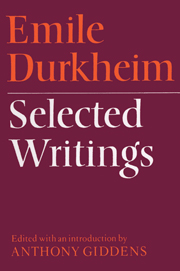Book contents
- Frontmatter
- Contents
- Preface
- Abbreviations
- Introduction: Durkheim's writings in sociology and social philosophy
- 1 The field of sociology
- 2 Methods of explanation and analysis
- 3 The science of morality
- 4 Moral obligation, duty and freedom
- 5 Forms of social solidarity
- 6 The division of labour and social differentiation
- 7 Analysis of socialist doctrines
- 8 Anomie and the moral structure of industry
- 9 Political sociology
- 10 The social bases of education
- 11 Religion and ritual
- 12 Secularisation and rationality
- 13 Sociology of knowledge
- Index
11 - Religion and ritual
Published online by Cambridge University Press: 05 August 2012
- Frontmatter
- Contents
- Preface
- Abbreviations
- Introduction: Durkheim's writings in sociology and social philosophy
- 1 The field of sociology
- 2 Methods of explanation and analysis
- 3 The science of morality
- 4 Moral obligation, duty and freedom
- 5 Forms of social solidarity
- 6 The division of labour and social differentiation
- 7 Analysis of socialist doctrines
- 8 Anomie and the moral structure of industry
- 9 Political sociology
- 10 The social bases of education
- 11 Religion and ritual
- 12 Secularisation and rationality
- 13 Sociology of knowledge
- Index
Summary
THE CONCEPTION OF RELIGION
[Written in review of Guyau's L'irréligion de l'avenir.]
For the author religion derives from a double source: firstly, the need to understand; and secondly, from sociability. We would say, at the outset, that these factors should be inverted, and that sociability should be made the determining cause of religious sentiment. Men did not begin by imagining gods; it is not because they conceived of them in a given fashion that they became bound to them by social feelings. They began by linking themselves to the things which they made use of, or which they suffered from, in the same way as they linked each of these to the other – without reflection, without the least kind of speculation. The theory only came later, in order to explain and make intelligible to these rudimentary minds the modes of behaviour which had thus been formed. Since these sentiments were quite similar to those which he observed in his relationships with his fellows, man conceived of these natural powers as beings comparable to himself; and since at the same time they differed amongst themselves, he attributed to these exceptional beings distinctive qualities which made them gods. Religious ideas thus result from the interpretation of pre-existing sentiments and, in order to study religion, we must penetrate to these sentiments, avoiding the ideas which are only the symbol and surface expression of these.
But there are two sorts of social sentiments. The first bind each individual to the person of his fellow-citizens: these are manifest within the community, in the day-to-day relationships of life.
- Type
- Chapter
- Information
- Emile Durkheim: Selected Writings , pp. 219 - 238Publisher: Cambridge University PressPrint publication year: 1972
- 2
- Cited by



